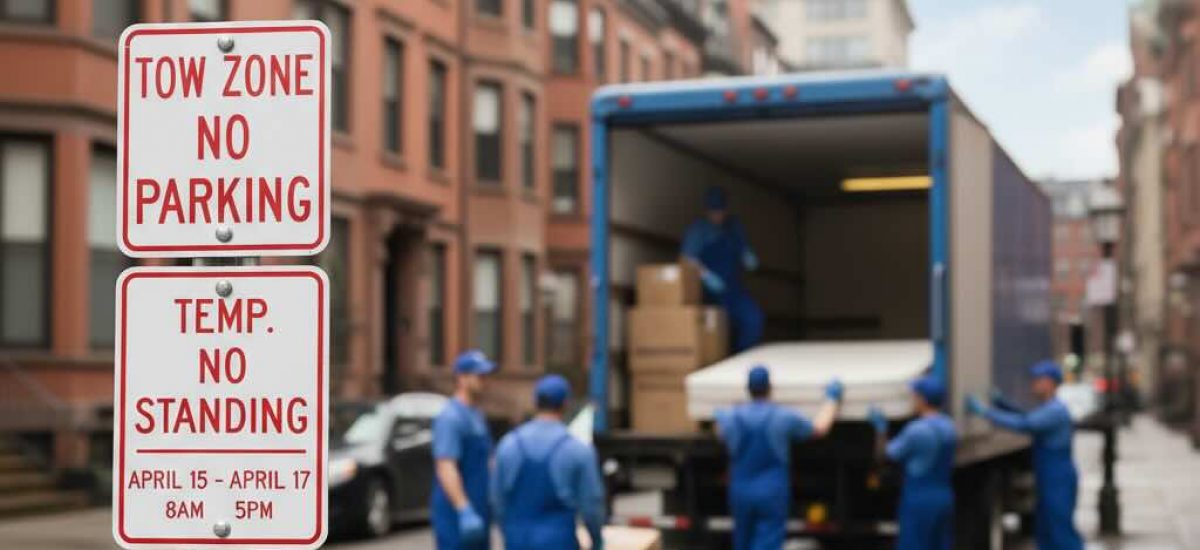To park a moving truck on a Boston street smoothly, you must first secure a Boston moving permit to reserve the necessary curb space for the day. The City issues a temporary street occupancy permit that sets aside two parking spots and helps you avoid tickets, double-parking, or long carries with furniture.
This guide explains costs, timelines, how to apply, what to post, and how day-of logistics work.
Key Points
- A standard permit typically reserves two legal parking spaces for one day, usually from 7:00 a.m. to 5:00 p.m. The permit applies to moving trucks rather than personal cars.
- For most neighborhoods, the common total is about $69 for non-metered spaces, which includes two official “No Parking” signs. If you reserve metered spots, expect roughly $40 more for the meters, bringing many metered permits close to $110.
- Online applications work best when your move is roughly two to eight weeks away. If you are closer than that, the City still accommodates permits in person with a short lead time.
- Official signs must be posted before the permit begins. Many residents place them at least 48 hours ahead and distribute fliers on nearby cars so drivers have clear notice.
- If someone parks inside your posted zone on move day, Boston Police non-emergency can help with towing after they attempt to contact the owner.
What the Permit Covers and When It Is Worth Getting One
The permit reserves curb space that would otherwise be first-come, first-served. In low-density areas it is occasionally possible to find parking without a permit, but most central neighborhoods benefit from having a guaranteed space. The reserved window is stated on your permit and typically runs 7:00 a.m. to 5:00 p.m. on the selected date. The space must be a legal parking area; hydrants, crosswalks, bus stops, and driveways are never eligible.
Fees and a Simple Cost Example
Boston calculates a moving-truck permit with a base fee, a small charge for the official signs, and an additional meter fee if you are reserving metered spaces. Card payments are accepted online; in person you can pay by card or cash.
| Line Item | When It Applies | Typical Amount |
|---|---|---|
| Base permit | All truck permits | Included in the common ~$69 non-metered total |
| Official signs (two) | Posted in advance to reserve the curb | Included in the ~$69 non-metered total |
| Meter fee | Only when reserving metered spaces | About $20 per meter per day (two meters ≈ $40), bringing many metered permits near $110 |
If your building requires a separate loading-dock or elevator reservation, that is handled by the property manager and sits outside the City’s fees.
When to Apply and Which Method to Use
Online filing: This path is designed for moves roughly 15 to 56 days away. After approval, the permit packet is mailed to the address on your account. If it has not arrived within about ten days of approval, contact the Parking Clerk several business days before your move so they can reissue materials if needed.
In-person filing: If your move date is closer than the online window allows, apply at Boston City Hall. Staff can issue a permit for many locations as long as you give them at least three business days. They can also assist with multi-day requests, which sometimes apply to large buildings or phased moves.
Conflict check: Before choosing your time, search the City’s Street Occupancy Permit database to see whether another reservation already exists on your block. Adjusting by an hour or shifting half a block can prevent day-of overlaps.
Posting Signs and Notifying Neighbors
Post the two official “No Parking” signs inside your reserved zone well before the start time. Many residents aim for 48 hours ahead for residential blocks, and at least one day ahead on metered streets. Place polite fliers on nearby cars for the same period so regular parkers have a chance to move. On move day, cones and tape help mark the space, but the printed signs are the legal notice. When you finish, remove all materials and leave the curb clean.
Day-of Logistics: Towing, Cones, and Common What-ifs
- A car is in your posted zone. Call the Boston Police non-emergency line with the plate number. Officers typically try to contact the owner first and will arrange towing if the vehicle does not move.
- Cones and tape. Use cones to reinforce the posted area and to create an approach path for the truck. Avoid placing anything in front of hydrants, crosswalks, or bus stops.
- Outdoor dining or construction lanes. During seasonal dining programs or active construction, certain curb lanes are unavailable. If this applies to your block, choose the nearest eligible space on the same street or around the corner and confirm it is legal parking.
- “Allston Christmas.” Around September 1, the City often pre-blocks specific corridors to manage heavy move-ins. Some locations operate under special rules that reduce the need for individual permits; check the City’s updates for that period.
Special Cases: Meters, Containers, and State-Managed Roads
Metered spaces: You may reserve metered spaces, but the permit total increases with the daily meter charge. Posting and flier timelines can be shorter on meters, so check the instructions that arrive with your packet.
Portable containers (PODs and similar): Containers follow a different process that usually requires an in-person application and a letter of authorization from the container company. If you prefer, bonded “permit puller” services can handle this step for a fee.
State-managed parkways: If your desired curb sits on a road managed by the Massachusetts Department of Conservation and Recreation, you will need a DCR temporary road access permit rather than a City permit. Timelines and fees differ from City Hall, so build in extra lead time.
Common Mistakes and How to Avoid Them
- Waiting too long to apply. Online filing closes inside the two-week mark. If you are closer than that, go in person at least three business days ahead so signs can be posted on time.
- Posting too late. Signs that go up the night before can lead to disputes. Posting at least 48 hours ahead on residential blocks gives regular parkers fair notice.
- Reserving a space that is not legal parking. Bus stops, hydrants, and crosswalks are never eligible. Choose a legal parking lane and confirm the exact frontage you plan to use.
- Assuming containers use the same rules as trucks. Container permits are handled differently, and City staff will ask for a letter from the provider. Starting early avoids last-minute changes.
FAQ
Do I absolutely need a moving permit?
In some lower-density areas you may find parking without one, but a permit greatly reduces the risk of tickets, double-parking, or long carries. In busy neighborhoods and on popular dates, it is the calmer choice.
How far in advance should I apply?
If you have two to eight weeks, apply online and wait for the mailed packet. If your timeline is tighter, apply in person at least three business days before your move so you still have time to post the signs.
What time window does the City usually allow?
Most permits reserve two spaces from 7:00 a.m. to 5:00 p.m. If you need a different span, ask at the time of filing. Multi-day permits can be arranged in some cases.
What if my building also needs a COI for the elevator?
That is a separate step handled with your mover and the property manager. The City permit covers curb space only; building rules about freight elevators, loading docks, and Certificates of Insurance remain in effect.
Can I switch to a different spot on the same block on move day?
You should load within the posted zone that matches your signs. If construction or a street event changes the block, contact the City or the non-emergency line for guidance before you park.
long distance moves
as low as $1748
Long-distance moving all across the United States. Experienced and insured, residential and commercial.
4.9/5 AVERAGE RATING
References
- City of Boston – Reserve a Parking Spot for Your Moving Truck (fees, timelines, posting rules, towing assistance).
- City of Boston – Moving Day Parking Permits (general guidance and seasonal notes).
- City of Boston – Street Occupancy Permit Lookup (check for conflicts on your block).
- Massachusetts DCR – Temporary Road Access & Moving Permits (when curb space sits on state-managed roads).
City policies can shift with seasonal programs and events. Treat these figures as current planning baselines and confirm details on the City pages when you apply.










